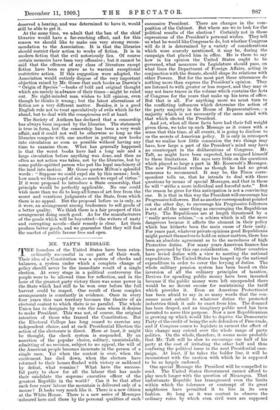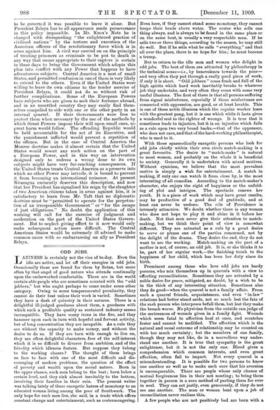MR. TAFT'S MESSAGE. T HE founders of the United States have
been extra- ordinarily successful in one part of their work. Their idea of a Constitution was a system of checks and balances, a system under which a complete change of policy should never be the immediate result of a single election. At every stage in a political controversy the people were to be allowed time for reflection, and in the hour of the greatest party victory there was some power in the State which had still to be won over before the full harvest could be reaped. One result of these complex arrangements is constantly in evidence. Once in every four years this vast territory becomes the theatre of an electoral contest to which there is no parallel. The whole Union has to designate by vote the man whom it desires to make President. This was not, of course, the original intention of those who framed the Constitution. But the Electoral College has long ceased to exercise any independent choice, and at each Presidential Election the action of the electorate is direct. Here at least, it might be thought, the check system is suspended. By an assertion of the popular choice, solitary, unmistakable, admitting of no revision, subject to no appeal, the will of the American people becomes incarnate in the person of a single man. Yet when the contest is over, when the excitement has died down, when the electors have returned, to their homes flushed with victory or saddened by defeat, what remains ? What have the success- ful party to show for all the labour that has made their candidate the " supreme executive officer of the greatest Republic in the world? Can it be that after each four years' labour the mountain is delivered only of a mouse? It looks very much like it. There is a new citizen at the White House. There is a new series of Messages =coloured here and there by the personal qualities of each successive President. There are changes in the com- position of the Cabinet. But where are we to look for the political results of the election ? Certainly not in these expressions of the President's personal wishes. They tell us what he would like Congress to do, but whether Congress will do it is determined by a variety of considerations which were scarcely mentioned, it may be, during the campaign that placed him in office. He is there to say how in his opinion the United States ought to be governed, what measures its Legislature should pass, on what lines the Department of Foreign Affairs, acting in conjunction with the Senate, should shape its relations with other Powers. But for the most part these utterances do nothing more than express the President's opinion. They are listened to with greater or less respect, and they may or may not leave traces in the volume which contains the Acts of Congress for the years that make up his term of office. But that is all. For anything more we must turn to the conflicting influences which determine the action of the party majority in the House of Representatives,—a majority which is not necessarily of the same mind with that which elected the President.
And yet, when all these facts have had their full weight given them, we take up each Message as it comes with a sense that this time, at all events, it is going to disclose to us the secrets of American policy. It is only in retrospect that we realise how little connexion the two things may have, how large a part of the President's mind may have no counterpart in the deliberations of Congress. Mr. Taft, as might have been expected, has resigned himself to these limitations. He says very little on the questions which played so large a part in Mr. Roosevelt's Messages. The new President writes as though he had no great measures to recommend. It may be, the Times corre- spondent tells us, that he intends to deal with these questions by means of special Messages, and that in these 'he will " strike a more individual and forceful note." But the reason he gives for this anticipation is not a convincing one. It is that in this way the President will encourage his Progressive followers. But as another correspondent pointed out the other day, to encourage his Progressive followers is not at all the same thing as encouraging the Republican Party. The Republicans are at length threatened by a "really serious schism,"—a schism which is all the more dangerous because it affects the element in their policy which has hitherto been the main cause of their unity. For years past, whatever private opinions good. Republicans might permit themselves to hold. on minor matters, there has been an absolute agreement as to the sacredness of high Protective duties. For many years American finance has been governed by this one consideration. Other countries have levied duties with a view to meeting the national expenditure. The United States has heaped up the national expenditure in order to cover the levying of duties. The whole military pension system has been based on this inversion of all the ordinary principles of taxation. Devices for spending public money have been invented because if the public money were left unexpended there would be no decent excuse for maintaining the tariff which provides it. Even an American Protectionist has been afraid to say in so many words that the con- sumer must submit to whatever duties the protected industries think it safe to exact from him. The demand has been draped, and an imaginary public need has been invented to serve this purpose. Now a new Republicanism is growing up which would. like to deprive the Democratic Party of the credit of being the sole defenders of Free-trade, and if Congress comes to legislate in earnest the effect of this change may extend over the whole range of party politics. On the whole, therefore, it seems more probable that Mr. Taft will be slow to encourage one half of his party at the cost of irritating the other half and thus confusing the political issue in the next Presidential cam- paign. At least, if he takes the bolder line, it will be inconsistent with the caution with which he is supposed to be so largely endowed.
One special Message the President will be compelled to send. The -United States Government cannot afford to play much longer with the question of Nicaragua. That unfortunate Republic has transgressed even the limits within which the tolerance or contempt of its great neighbours have permitted it to live in its own fashion. So long as it was content to observe the ordinary rules by which even civil wars are supposed to be governed it was possible to leave it alone. But President Zelaya has to all appearance made perseverance in this policy impossible. In Mr. Knox's Note he is charged with disregarding "the enlightened practice of civilised nations" by the torture and execution of the American officers of the revolutionary force which is in arms against him. A civil war carried on on the principle of treating prisoners as criminals to be put to death in any way that seems appropriate to their captors is certain in these days to bring the Government which adopts this plan into conflict with any Power that happens to have adventurous subjects. Central America is a nest of small States, and permitted confusion in one of them is very likely to extend to the others. Even if the United States were willing to leave its own citizens to the tender mercies of President Zelaya, it could not do so without risk of further complications. Some of the European Powers have subjects who are given to seek their fortunes abroad, and in an unsettled country they may easily find them- selves compelled to side with one or the other party in an internal quarrel. If their Governments were free to protect them when necessary by the use of the methods by -Which Great Powers impose their will upon small ones, no great harm would follow. The offending Republic would be held accountable for the act of its Executive, and the punishment inflicted would prevent a repetition of the offence. But in the case of Central America the Monroe doctrine makes it almost certain that the United States would resent any such action on the part of a European Power, and in this way an intervention designed only to redress a wrong done to its own subjects might have very far-reaching consequences. If the United States treats Central America as a preserve into which no other Power may intrude, it is bound to prevent it from becoming an international nuisance. At present Nicaragua eminently deserves this description, and now that her President has signalised his reign by the slaughter of two American citizens taken in arms against him, it is satisfactory to learn from Mr. Taft that no diplomatic doctrine must be "permitted to operate for the perpetua- tion of an irresponsible Government" or "for the escape af just obligations." No doubt the application of this warning will call for the exercise of judgment and moderation on the part of the United States Govern- ment. But to neglect giving effect to it now would only make subsequent action more difficult. The Central American States would be extremely ill advised to make common cause with so embarrassing an ally as President Zelaya.

























































 Previous page
Previous page